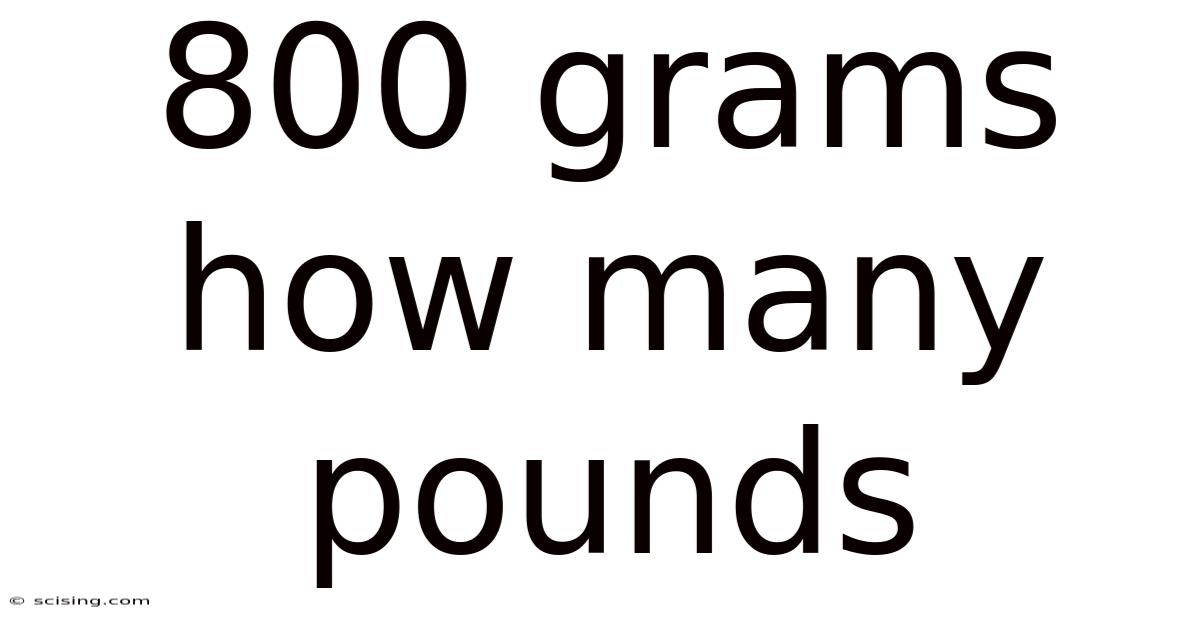800 Grams How Many Pounds
scising
Sep 24, 2025 · 4 min read

Table of Contents
800 Grams: How Many Pounds? A Comprehensive Guide to Metric and Imperial Conversions
Are you struggling with converting 800 grams to pounds? You're not alone! Many people find themselves needing to convert between the metric system (grams, kilograms) and the imperial system (ounces, pounds) for various reasons – from cooking and baking to understanding product specifications and shipping weights. This comprehensive guide will not only tell you how many pounds are in 800 grams but will also equip you with the knowledge and tools to confidently perform these conversions in the future. We'll delve into the underlying principles, offer practical examples, and answer frequently asked questions to solidify your understanding.
Understanding the Systems of Measurement
Before we jump into the conversion of 800 grams to pounds, let's briefly review the two systems involved:
-
The Metric System: This system, based on units of ten, is used worldwide and is preferred by scientists and many countries. The fundamental unit of mass is the kilogram (kg), with the gram (g) being a smaller unit (1000 grams = 1 kilogram).
-
The Imperial System: Primarily used in the United States and a few other countries, this system uses units like pounds (lbs), ounces (oz), and tons. It's less standardized than the metric system, making conversions sometimes more complex.
Converting 800 Grams to Pounds: The Calculation
The core conversion factor you need to remember is:
1 pound (lb) ≈ 453.592 grams (g)
Notice the "≈" symbol; this means "approximately equal to." The conversion isn't perfectly precise because the relationship between pounds and grams isn't a simple whole number ratio.
To convert 800 grams to pounds, we'll use the following formula:
Pounds = Grams / 453.592
Plugging in our value:
Pounds = 800 g / 453.592 g/lb ≈ 1.7637 lbs
Therefore, 800 grams is approximately equal to 1.76 pounds.
Practical Applications and Examples
Understanding this conversion is crucial in various everyday situations. Let's consider some examples:
-
Cooking and Baking: Many recipes, especially those originating from the US, use pounds for ingredients like flour, sugar, or butter. If a recipe calls for 1.75 pounds of flour, and your scale only measures in grams, you can easily convert it to grams using the inverse of the conversion factor (multiply by 453.592).
-
Shipping and Logistics: When shipping packages internationally, understanding weight conversions is essential to accurately calculate shipping costs. Different countries use different measurement systems, so converting weights is often necessary.
-
Product Specifications: Product descriptions may list weight in either grams or pounds. Knowing how to convert ensures you understand the actual weight of the product.
-
Scientific Experiments: In scientific research, data might be recorded using different units. Converting between grams and pounds allows for consistent analysis and comparison of results.
Beyond the Basics: Further Exploring Conversions
While the direct conversion above is sufficient for many situations, let's explore some related conversions to build a more comprehensive understanding:
-
Grams to Ounces: Since there are 16 ounces in a pound, you can first convert grams to pounds and then to ounces. Alternatively, you can use the direct conversion factor of approximately 28.35 grams per ounce.
-
Kilograms to Pounds: If you're dealing with larger quantities, you might need to convert kilograms to pounds. Since there are 1000 grams in a kilogram, you can simply multiply the kilograms by 2.20462 to get the equivalent weight in pounds.
-
Using Online Converters: Many free online converters are readily available, providing a quick and easy way to convert between grams and pounds, as well as other units of weight and measurement. While convenient, it's still beneficial to understand the underlying principles.
Frequently Asked Questions (FAQ)
Q: Is the conversion of 800 grams to pounds exact?
A: No, the conversion is approximate. The conversion factor of 453.592 grams per pound is a rounded value. The actual value is a more complex decimal, resulting in a slight difference depending on the level of precision required.
Q: Why are there two different systems of measurement?
A: The metric system is a more modern, logically structured system based on powers of 10. The imperial system evolved over time and lacks this consistent structure, leading to complexities in conversions.
Q: Which system is better?
A: The metric system is widely considered more practical due to its simplified conversion between units. However, the imperial system remains in use in certain regions due to historical reasons and established practices.
Q: Are there any other units of mass I should be aware of?
A: Yes, other units of mass include milligrams (mg), metric tons (t), and long tons. Each has its specific place in different contexts.
Conclusion: Mastering Weight Conversions
Converting 800 grams to pounds, and mastering weight conversions in general, is a valuable skill applicable in various facets of life. While using online converters is convenient, understanding the fundamental principles behind the conversions enhances problem-solving skills and promotes a deeper understanding of measurement systems. Remember the key conversion factor (1 lb ≈ 453.592 g) and practice applying the formula. With a little practice, you'll confidently navigate the world of metric and imperial weights. You've now got the tools to successfully tackle any weight conversion challenges that come your way. Keep practicing, and you'll soon become an expert in this essential skill!
Latest Posts
Latest Posts
-
87 Weeks Ago From Today
Sep 24, 2025
-
Who Is The Fertility Goddess
Sep 24, 2025
-
How Are You Feeling Spanish
Sep 24, 2025
-
Camelot King Arthur And Guinevere
Sep 24, 2025
-
Similar Books To Kite Runner
Sep 24, 2025
Related Post
Thank you for visiting our website which covers about 800 Grams How Many Pounds . We hope the information provided has been useful to you. Feel free to contact us if you have any questions or need further assistance. See you next time and don't miss to bookmark.